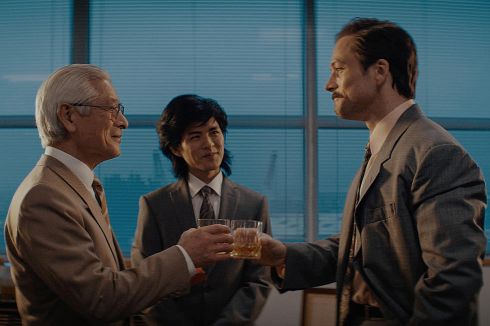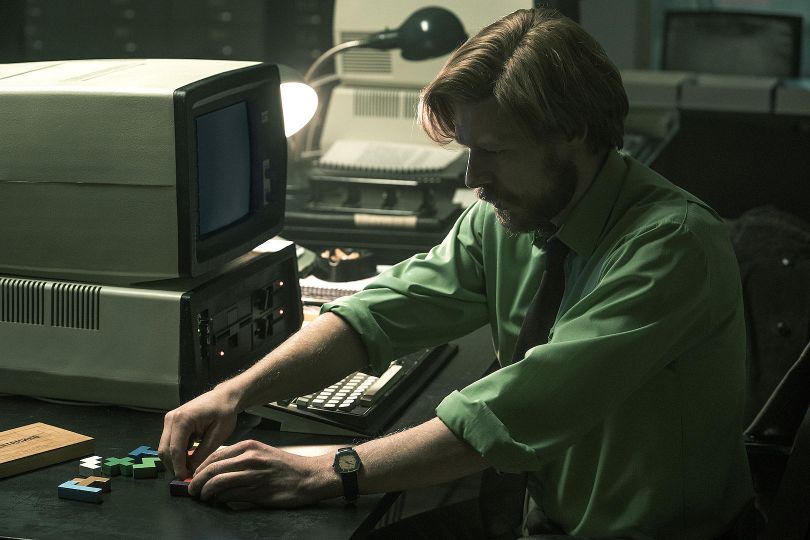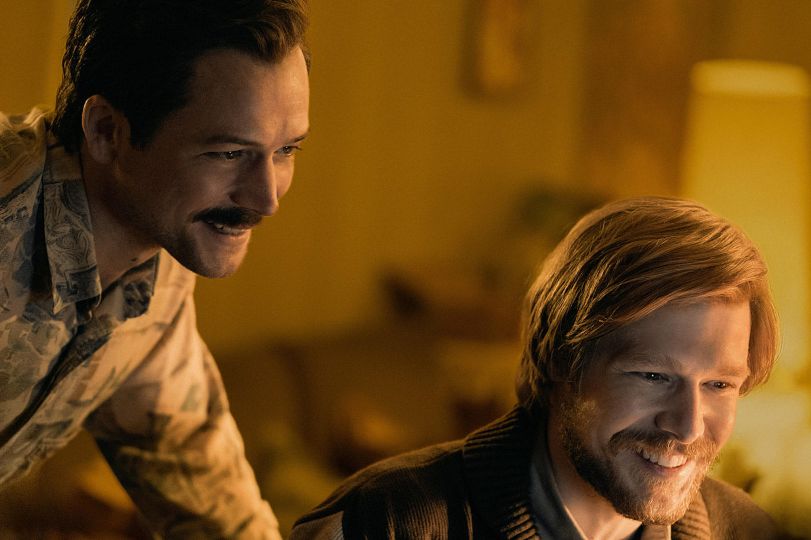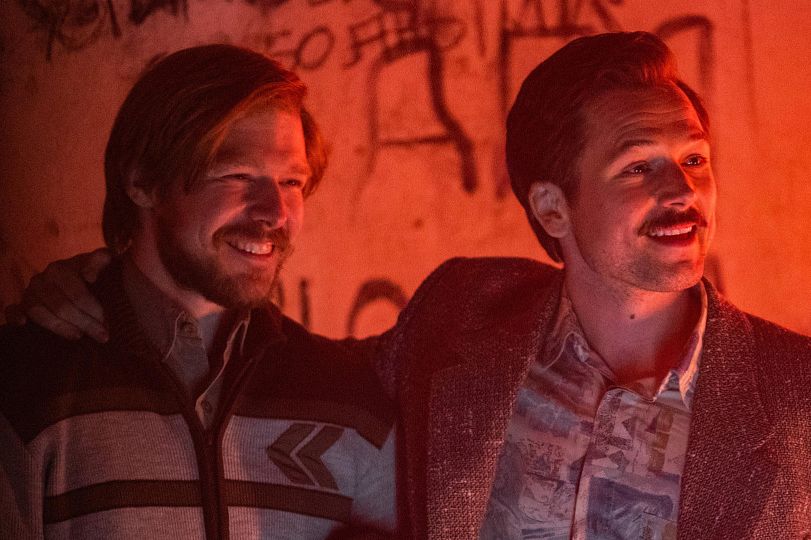The plot of the Tetris movie is almost as ridiculous as the idea of an Italian plumber going to a magical country to battle a gigantic turtle and save a princess. Alexey Pajitnov, a modest computer engineer from Russia, invented the original Tetris game, which is the subject of this crazy legal battle.
Henk Rogers is portrayed by Taron Egerton. He is an ambitious game inventor and businessman who finds an early version of Tetris at a trade fair and becomes infatuated with it. While avoiding, outbidding, and outsmarting several competitors, including a cunning European businessman named Robert Stein (Toby Jones) and the haughty Kevin Maxwell (Anthony Boyle), the CEO of one of Britain’s largest media companies, Rogers mortgages his home, leverages his company, and potentially faces imprisonment behind the Iron Curtain in order to secure the rights to sell Tetris in the West.
According to the opening title card, Tetris was “based on a true story.” But how accurate is the movie version? It is really accurate in certain aspects. In some instances, it is a total fiction. However, there are a few instances where the distinction between legitimate and fake content can surprise you. (In other cases, they very certainly won’t.)
The Real Story of Tetris
The main characters and all the broad strokes of Tetris are largely accurate. In the movie, it is revealed that Alexey Pajitnov, a Russian computer scientist (played by Nikita Yefremov), designed the well-known puzzle game in his free time. Tetris, a name that combines “tetra” (or four) with “tennis” (which has absolutely little to do with the end game, but whatever), was created by Pajitnov out of his lifelong passion for puzzles. The game’s early iterations, as depicted in the movie, were exceedingly primitive; because Pajitnov created the programme on a computer without a graphics card, the original tetromino pieces were constructed of brackets.
This was Russia in the middle of the 1980s, just as communism was coming to an end. As a result, Pajitnov was unable to sell his game or make money from the rights to it. Tetris was instead initially distributed by him to friends and coworkers in Russia, where it quickly caught on because to its extreme addictiveness. Similar to the Tetris movie, copies of the game even made it to Hungary, where Andromeda Software salesman Robert Stein first saw them. Stein was impressed by the game and was able to reach Pajitnov through his contacts in Russia. They exchanged a number of faxes showing Stein’s desire to licence the game and Pajitnov’s readiness to work with him.
The British media billionaire Robert Maxwell, who is portrayed by Roger Allam in the movie, owns Mirrorsoft, which Stein started selling the rights to create Tetris to after interpreting the faxes as a contract. But the ambiguity between what Stein believed he had and what he actually did lead to a wild rush for Tetris rights in many countries and on numerous platforms, including computers, arcades, video game consoles, and portable devices.
The Film Version
The main character of the Tetris movie is not Pajitnov or Stein, but rather Henk Rogers, a Dutch game designer and salesman who eventually acts as a go-between for Nintendo and the Soviet government agency “Elorg,” which holds the rights to Tetris, and the company that would go on to make Tetris a cultural icon by bundling it with its first portable Game Boy video game system.
Rogers, as portrayed by Egerton in the film, is a charming, tenacious, but ultimately very honest businessman. After obtaining the rights to distribute Tetris in Japan, he persuades Nintendo to allow him to create a version for the Famicon, which is essentially the Japanese equivalent of the Nintendo Entertainment System. Rogers is the one who advises Tetris be used as the game included with each device when Nintendo shows Rogers the prototype Game Boy rather than a new Super Mario Bros. Rogers travels to Russia with a tourist’s visa, which is a massive no-no, and enters into Elorg without an appointment to negotiate his own contract after failing to obtain handheld rights from Stein and Mirrorsoft.
This results in a ridiculous scene where, by pure coincidence, Rogers, Stein, and Kevin Maxwell of Mirrorsoft are all negotiating their own deals with Elorg in separate conference rooms at the same time, while the organisation’s leader, a man by the name of Belikov, tries to get the best possible deal for the Soviets. Belikov initially charges Rogers with selling Tetris copies that are unlawful bootlegs since he doesn’t think anyone has the rights to produce Tetris versions for gaming consoles like the Nintendo.
It turns out that Stein had a very broad interpretation of his first agreement with Elorg, believing that his rights to market Tetris for computers also applied to home video game systems. Despite Robert Maxwell travelling to Russia and attempting to pressure Elorg to sell him the rights to the game using his friendship with Soviet Union leader Mikhail Gorbachev, Belikov forces Stein to sign a new contract after Rogers points out the flaw in the contracts. This effectively cuts him out of the Tetris gravy train for consoles and handheld games entirely.
Separating Fact From Fiction
Even though the conference room scene seems absurd, it appears to be largely based on what actually occurred. The BBC documentary Tetris: From Russia With Love, which you can view below, claims that Belikov and Elorg actually held concurrent discussions with each of these parties, essentially putting them against one another. Another YouTube documentary, The Story of Tetris, even supports the idea that Rogers was the one who gave Belikov the advantage in the talks by pointing out the problems with Elorg’s contracts with Stein. Additionally, it appears true that the Maxwells made an effort to sway Gorbachev in their favour during the negotiations, a ploy that eventually failed.
The involvement of Soviet politicians and KGB agents trying to intimidate Henk Rogers into giving up his pursuit of the Tetris rights is not accurate, or at least is not mentioned in any version of the creation of Tetris and the negotiations for the right to produce the game around the world that I could find. Some of the threats depicted in the movie actually came to pass; according to Rogers, who confirmed this in a documentary, when he gave Elorg a copy of Tetris for Famicon, they really did accuse him of stealing, and he did worry for a moment that he may wind up in a Russian labour camp.
However, other aspects of the KGB’s strategy are wholly made up for the movie. The movie’s final pursuit sequence, in which Henk Rogers and several Nintendo employees race to the airport while being escorted there by Pajitnov in order to flee Moscow before the KGB can capture them, was not actually shot, according to Jon S. Baird in an interview with Collider. He explained that…
We were using that as a bit of a metaphor because they were under a lot of pressure from the KGB, Maxwells, and other parties. However, the car chase they went on to get to the airport through the heart of Moscow was unmistakably a Hollywood interpretation of their pursuit by the competing Tetris factions.
The real Henk Rogers stated in a different interview that while he and Alexey Pajitnov did consult on the film’s script and the creators did pay attention when their suggestions “had to do with authenticity,” when it started getting into [creative flourishes like] the car chase and all that, it was like, “OK, now it’s all them,” he added. Nothing could be changed by us.
So it should come as no surprise that the film’s largest and most drastic alteration is the chaotic car chase. In a few weeks, ScreenCrush will discuss how The Super Mario Bros. Movie differs from the true account of Mario Mario’s adventure to the Mushroom Kingdom. Make sure to check back then. Additionally, this BBC documentary features interviews with many of the important characters, including Rogers, Stein, and Pajitnov, if you’re interested in learning more about the true history of Tetris.
And to present an even more thorough account of the events, this film integrates details from that documentary as well as other sources.
The following is a link to Apple’s own film about “the story behind Tetris”:
Certain cinemas are showing Tetris. On March 31, it will be accessible on Apple TV+.




